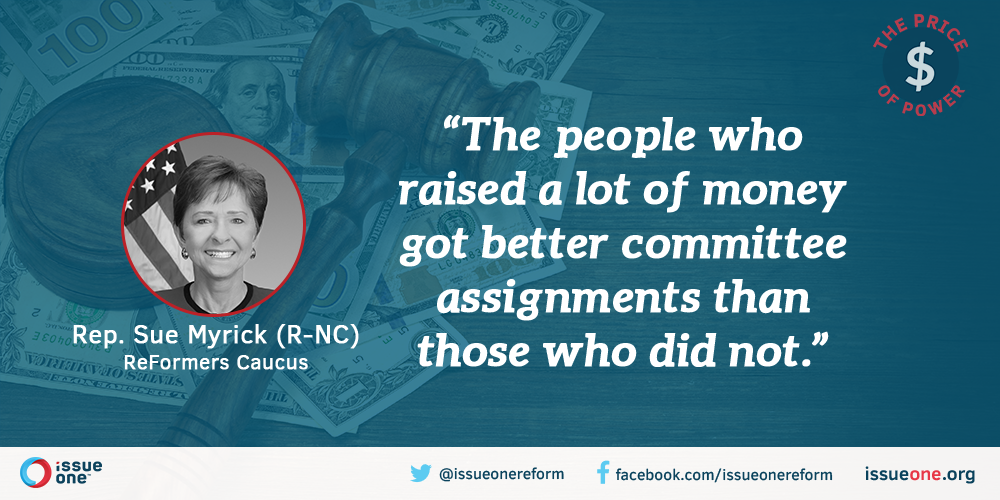To help inform Issue One’s landmark report, “The Price of Power,” we interviewed several members of our bipartisan ReFormers Caucus at-length about their experiences with fundraising and concerns with the “committee tax” imposed on lawmakers.
Every Tuesday and Thursday over the next few weeks, we will release edited excerpts of those conversations with these former lawmakers to supplement and expand on the disturbing picture the report painted: that of a broken democracy, which Congress itself must act to fix.
***
Sue Myrick, a member of Issue One’s ReFormers Caucus, is a Republican who represented North Carolina’s 9th Congressional District in the U.S. House of Representatives from January 1995 until January 2013. She previously served as the mayor of Charlotte from 1987 until 1991.
What was your experience with the role of fundraising and committee assignments?
When you’re on a certain committee, like what they call ‘A’ committees, then your dues payable are higher than they would be if you’re on a ‘B’ committee. That’s how it works on both sides of the aisle from what I understand. But how I got my committee assignments had nothing to do with the money side.
What do you think of that system?
The problem is if you get a committee assignment based on how much money you raise rather than on whether or not you’re the best person qualified for the job.
How often does that happen?
People have said that there are people who were skipped over for certain committees just because someone else has raised a lot more money for the committee.
What criteria should the steering committee be using when it comes to deciding who is getting on which committees and who’s getting chairmanships?
Their background, what kind of experience they have that would qualify them for the committee. Geography can be taken into account, too, because you don’t want three people from the same area on the same committee. It’s very important that you have representation across the country on committees. But the qualifications are the most important thing. For instance, a banker who wants to be on a financial services-related committee or a small business owner who wants to be on small business. That should definitely be a qualifier.
Do you think too much attention is being paid now to a person’s fundraising capability?
It seems that way. One way that played out: The people who raised a lot of money got better committee assignments than those who did not.
When it comes to “party dues,” some of it seems to be money that is transferred directly from the campaign committee to the NRCC, and some of it is “dialing for dollars,” fundraising for the NRCC itself, and some of it is contributing to vulnerable members.
I never had the kind of money where I could transfer amounts from my campaign other than small amounts. I always had to make calls to try and raise additional money.
What was your experience like “dialing for dollars”?
It depended on the year and who was in control of Congress. If your party is in control, it’s a lot easier to raise money than it is if the other party is in control. You can call from lists, but it’s hard to call and ask for money from somebody you don’t know and who doesn’t know you. Why would they give it?
Do you think it would be a good idea for the House to adopt a rule that says the parties, or the steering committees, shouldn’t be allowed to use fundraising to determine the committee assignments?
Yeah, I think something needs to be done. I really do because it’s just gotten out of hand. The money in politics today is astronomical. You’re talking billions overall instead of millions like it used to be.
What do you think has been the cause of this increased pressure on the “A” committees, on the committee chairs, to raise this type of money for the party?
Because it costs so much to run a campaign today. That’s the problem. Everybody has to raise so much money, and it’s gotten to the point that it’s just really ridiculous, you know? People spend 12, 15 million dollars for a congressional campaign. It’s crazy.
How did you witness that changing over your years in Congress?
My experience was a little different, simply because my background is advertising and marketing. So I were able to do my own advertising. I did not have to pay outside consultants to do that. I wasn’t paying a bunch of people for their advice and all that. The amount that I raised was one to two million dollars. Of course, it depends on your media market too.
How does that fundraising pressure affect members of Congress?
The cost has just gotten out of hand. You don’t have any choice but to raise that kind of money, and the pressure is put on everybody to do it. It’s very difficult because you don’t have time to be making calls all the time, even though that’s what you’re expected to do.
How did you deal with that pressure?
My last couple years, I just said I’m not going to do it. I told them kick me off the committee if you want, but I’m not going to do it.
What was their response when you said that?
They didn’t say anything to me. They didn’t like it, but nobody kicked me off the committee. I just was disgusted with it, tired of doing it, and I didn’t have a district where I could raise that kind of money all the time. Some people have districts where there are a lot of wealthy people who contribute to politics. And then there are other districts where there are only so many people who contribute to politics in the overall scope. Once they get tapped out, they’re tapped out.
How much time would you say you had to spend, during a typical day or week, on fundraising?
You try and get some time every day. Spend an hour, two hours raising money. It’s not always possible, and that’s the challenge. The schedules are so hectic, and there’s so much to do that it’s really hard to get time to go over to the NRCC headquarters where you make the calls. I was not one that went out and partied and went to dinners and all that. I just worked. I was a workaholic. I just approached it differently.
What do you think members of Congress would be able to do or get done if they didn’t have to spend that much time fundraising each day?
It would be more attention to their jobs. Very simple. For me, it’s always been public service; it hasn’t been politics. I’m there to serve the people. They put me there, and I’m there to serve them. That’s not the case with a lot of people. With a lot of people, it’s all politics. Some people love to raise money. I don’t know why, but they do. Maybe it’s a challenge.
Yeah, but I’ve heard a lot more complaints than people who love doing it.
Yeah, I would think so because it’s a pain in the neck.
Former Rep. Sue Myrick (R-NC) is a member of Issue One’s ReFormers Caucus, the largest bipartisan coalition ever assembled on behalf of political reform and government ethics. Read more about “The Price of Power” here.






